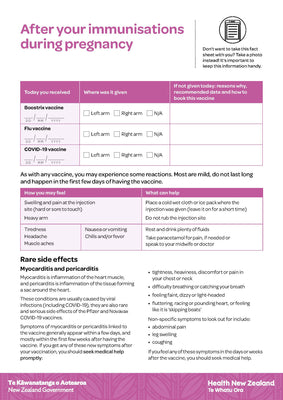After your immunisation during pregnancy - NIP8706

Information for consumers about immunisations during pregnancy. Printed copies can be ordered from the National Immunisation Programme Bluestar portal
The full resource:
After your immunisations during pregnancy
As with any vaccine, you may experience some reactions. Most are mild, do not last long
and happen in the first few days of having the vaccine.
What you may feel |
What can help |
|
Swelling and pain at the injection site (hard or sore to touch) Heavy arm |
Place a cold wet cloth or ice pack where the injection was given (leave it on for a short time) Do not rub the injection site |
|
Tiredness Headache Muscle aches Nausea or vomiting Chills and/or fever |
Rest and drink plenty of fluids Take paracetamol for pain, if needed or speak to your midwife or doctor |
Rare side effects
Myocarditis and pericarditis
Myocarditis is inflammation of the heart muscle, and pericarditis is inflammation of the tissue forming a sac around the heart.
These conditions are usually caused by viral infections (including COVID-19), they are also rare and serious side effects of the Pfizer and Novavax COVID-19 vaccines.
Symptoms of myocarditis or pericarditis linked to the vaccine generally appear within a few days, and mostly within the first few weeks after having the vaccine. If you get any of these new symptoms after your vaccination, you should seek medical help promptly:
- tightness, heaviness, discomfort or pain in your chest or neck
- difficulty breathing or catching your breath
- feeling faint, dizzy or light-headed
- fluttering, racing or pounding heart, or feeling like it is ‘skipping beats’
Non-specific symptoms to look out for include:
- abdominal pain
- leg swelling
- coughing
If you feel any of these symptoms in the days or weeks after the vaccine, you should seek medical help.
Allergic reactions
A severe allergic reaction (anaphylaxis) is very rare but serious. This is the reason you will be asked to stay for up to 20 minutes after the vaccination. Vaccinators are trained to manage these reactions if they occur and have the equipment for this.
Reporting reactions
You can report reactions at any time at nzphvc.otago.ac.nz/contact. You don’t have to be sure that the vaccine caused the reaction to make a report.
If you have any concerns about your symptoms after your vaccine, talk to your doctor, practice nurse, community pharmacist or call Healthline on 0800 611 116 anytime to get advice.
If you have immediate concerns about your safety, call 111 and let them know what vaccines you have received and that you are pregnant.
Visit info.health.nz/bookavaccine to make your next appointment or talk to your vaccinator.